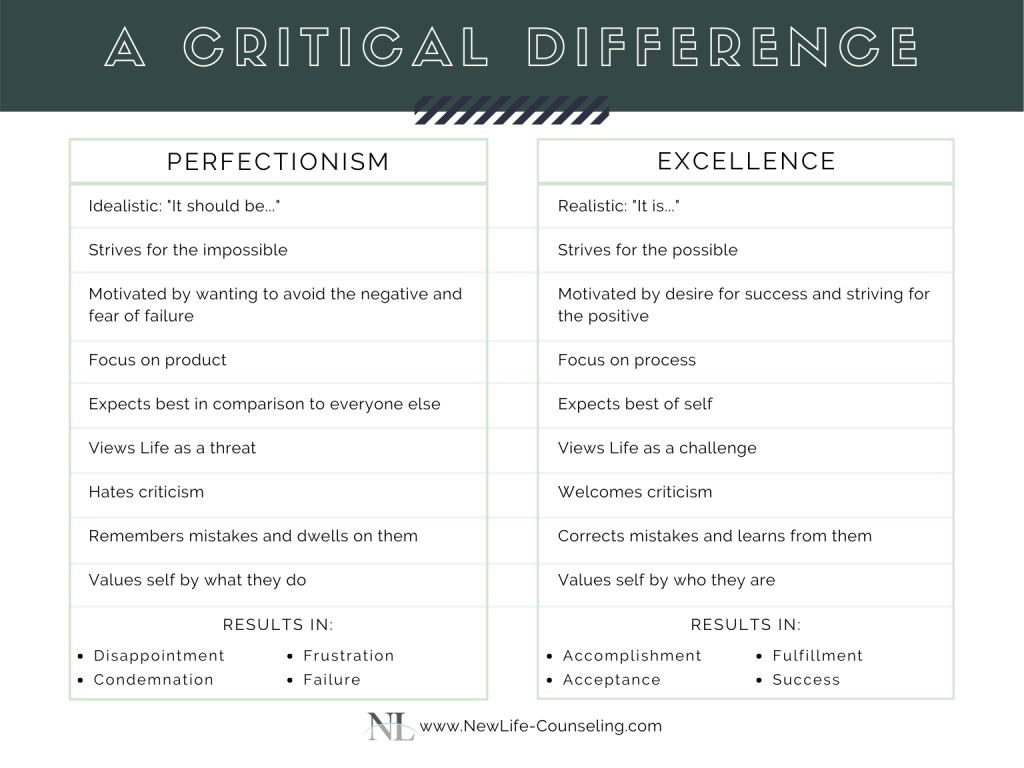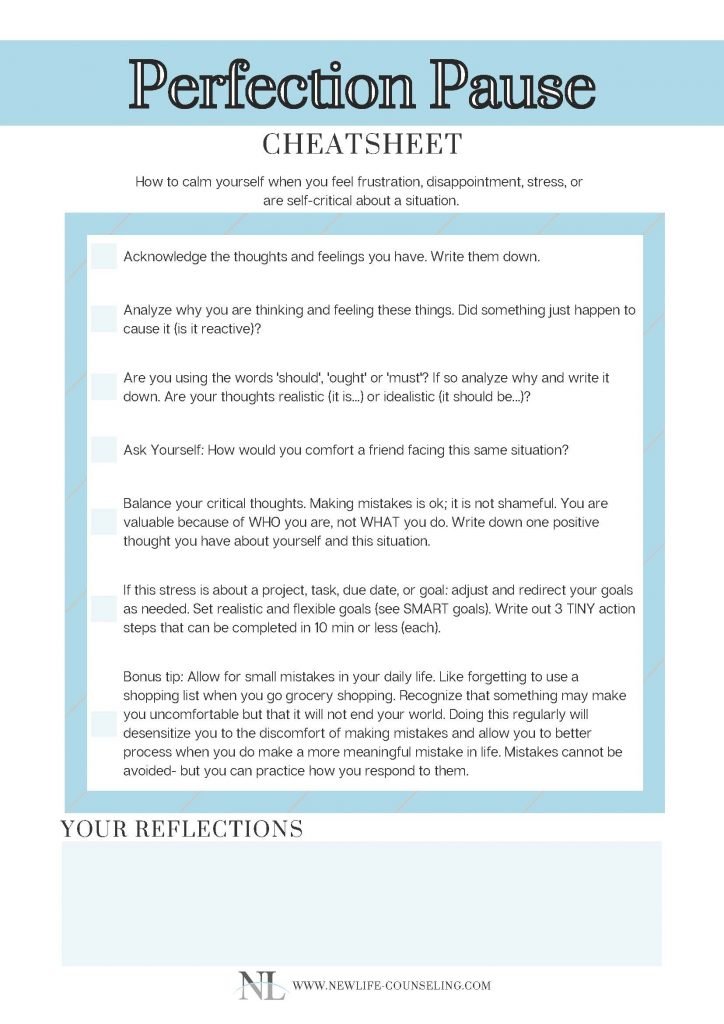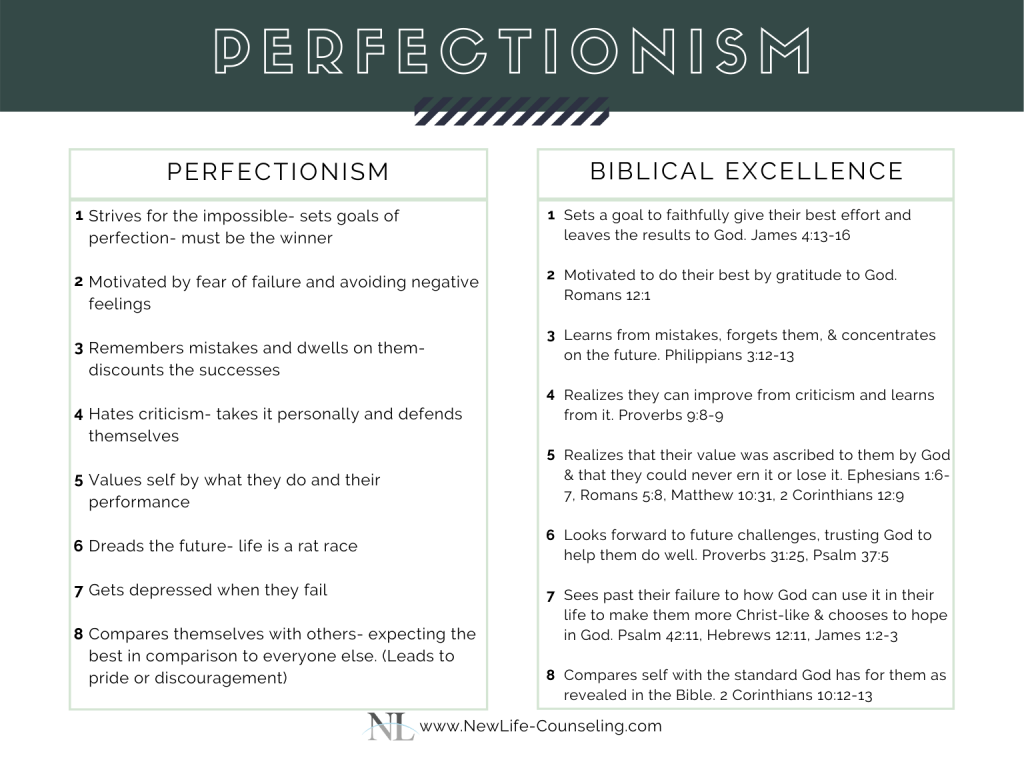How to Break the Perfectionism Cycle
People think that perfectionism helps achieve goals.
“Perfectionism, even though it creates powerful turmoil, is often maintained and understood as a positive thing.” a
The medical definition of perfectionism according to Merriam-Webster b is “A disposition to regard anything short of perfection as unacceptable, especially the setting of unrealistically demanding goals accompanied by a disposition to regard failure to achieve them as unacceptable and a sign of personal worthlessness.”
Many would say that perfection is a personality type or justify perfectionistic behavior by saying they have “healthy perfectionism.” Healthy perfectionism is an oxymoron; it is not about healthy growth, success or striving for the positive. Healthy is a growth mindset or the pursuit of excellence- which is quite a bit different than striving for perfection.

This is part 3 of our 4-part series on Goals. You can check out part one where we talk about setting goals you can actually achieve and how to break them down into manageable bite size pieces while using healthy terminology. Part two can be found here- Relationship goals.
So how does perfectionism relate to goal setting?
Perfectionist goal setting is by definition self-contradictory. Healthy goals are realistic, obtainable, positive, and in line with the vision for our lives. A true perfectionist doesn’t have healthy vision. (At the end I will give you a few tips and strategies for reducing perfectionism behaviors.)
This cycle reinforces itself.
Take a look at this image below- this shows how a perfectionist’s unreasonable standards or inflexibility in life causes destructive behaviors, self-criticism, and ultimately failure.

Because perfectionism is so widely accepted, any successes it produces are typically met with praise and recognition. This praise reinforces this cycle of behavior because the perfectionist may decide that the original standards weren’t high enough, set higher standards, deem themselves unworthy of the praise, and/or have anxiety at maintaining this level of performance (Image 2 above). Excellence, however, simply accepts the praise.
If the perfectionist isn’t successful- the ensuing self-criticism and diminishing self-worth leads to further anxiety, alienation, depression, and more destructive impulses and tendencies. They will do anything to avoid further criticism, dwelling and obsessing over past mistakes.
The cycle keeps you from learning if your perfectionistic beliefs are true. For example, “a person who struggles delegating tasks to colleagues may hold the belief that this is necessary to maintain their high standards in the workplace. By continuing to not delegate work, the perfectionist is unable to test out whether their beliefs are accurate.” d
Perfection isn’t always a picture of high achievement. Often a perfectionist will simply not try in order to keep expectations low and avoid failure.
In their book, Hewitt, Flett and Mikail explain how perfectionistic behavior is a paradox: a
“Perfectionism is the result of one of the most basic motivating forces among humans: the need to attain a sense of felt security and self-regard through being accepted, respected, and cared for, and mattering to others- in essence, a sense of belonging. Yet the perfectionistic behavior produces a lack of closeness, intimacy, and connection with others, and results in the alienation and belief in one’s defectiveness and separateness from others.”
Can you relate to any of these statements?
- It is extremely important that others think well of me.
- My boss or teacher will think I’m incompetent if I make a mistake in my work.
- When I look back at my life, I can only see failures; I can always do better.
- No matter how hard I try, I feel like I’m not good enough for my family or partner.
- If I can’t do it perfectly, then there is no point trying.
- Nothing good comes from mistakes.
- I hate criticism.
- I should be able to do things right the first time.
- I must do everything well- not just the things I know I’m good at.
- I would rather do it the right way myself than allow others to mess it up.
Or perhaps these behaviors?
- Procrastination
- Giving up (too soon or before starting)
- Avoidance (of situations where failure is possible)
- Decision making paralysis (afraid of making the wrong choice or taking too long to choose that you miss out)
- Overcompensation
- Pursuing perfection (without boundaries or limits- often to your detriment)
- Excessive checking, organizing, list making
- Correcting others
There are a few specific automatic thought patterns that contribute to these statements and behaviors:
- Polarized thinking: Things are black or white, good, or bad. You have to be perfect or you’re a failure. There is no middle ground
- Should and Ought’s: You have a list of ironclad rules about how you and other people should act. People who break the rules anger you and you feel guilty if you violate the rules.
- Filtering: You take the negative details and magnify them while filtering out all positive aspects of a situation.
- Mind Reading: Without their saying so, you know what people are feeling and why they act the way they do. In particular, you are able to define how people are feeling towards you.
- Personalization: Thinking that everything people do or say is some kind of reaction to you. You also compare yourself to others.
- Emotional Reasoning: You feel that what you believe must be true- automatically. If you feel stupid and boring, then you must be stupid and boring.
We like to call these Anxious Negative Thoughts or ANTs. They are irrational or errors in our thinking that negatively distort our perception of reality. They are often automatic and can be difficult to identify if we aren’t aware of them.
How do you cope and break the cycle of perfectionism?
1. Challenge your thinking.
Fill out the form and use this Free Thought Challenge Worksheet we created to help you evaluate your ANTs and thought patterns (reference the list of ANTs above).
Work to reframe your thoughts into healthier statements. You can also keep a thought diary. This is another great free resource if you want more guidance on how to keep a thought diary.

2. Set Boundaries for yourself.
Notice perfectionism’s drive to ignore your body’s signals or your family’s need for connection. Set a boundary to preserve your connections and take care of yourself physically. Whether that means setting a timer or setting reasonable goals. If you are stuck, ask a close family member what they need from you and brainstorm healthy personal boundaries together.
3. Offer yourself compassion and grace.
Commit to speaking kindly to yourself. You are not what you do; give yourself permission to fail and learn from your mistakes. Take responsibility for what is in your control- learn from it and move on but let go of the things that were outside your control. Recognize that making a mistake might make you uncomfortable, and they cannot be wholly avoided, but you can practice how you respond to them.
4. Adjust your priorities.
Practice progress- not perfection. I’m sure you have heard this, but it is vital for growth. If you are stuck in a decision or procrastination: write 3 tiny action steps that can be completed in less than 10 min (each). Commit to starting it and being ok if its not perfect. Just start and the rest often falls into place. If you are still stuck, work to make the process enjoyable or fun. Laugh your way through it and let go of the outcome.
5. Quit the comparison.
You don’t need to engage in comparison as it breeds envy, jealousy, and is a waste of energy. Instead of envy- choose to be inspired by other’s success. Think about what expectations are right for you right now. You don’t need to be like someone else or hit their target. Likewise- remember that others are doing the best they can in that moment and comparing yourself to them (being arrogant) will not fulfil your pursuit of accomplishment. Even better- work to unlink your self-worth from your accomplishments.

Feel free to download this cheatsheet that may help you pause your perfectionism and break this cycle.
“Perfectionism is self-abuse of the highest order”
Anne Wilson Schaef
Fill out the form below to download the cheatsheet.
How do you practice excellence in your goal setting?
In addition to the 5 tips above:
- Focus on your baby action steps to achieve your objectives.
- Write things in the positive and present tense
- Know your why
- Review and adjust often
- Check out part one of the goal setting series here
BONUS: What does the bible have to say about this?

Do you need help breaking the cycle of perfection or setting your 2021 goals?
Have you ever thought about talking with a therapist or life coach to help you break the cycle of perfectionism or set up your goals? It can sometimes be difficult to go through the process of identifying your automatic thought processes and identifying what goals are attainable. We don’t want you to be overwhelmed, that is why we are prepared to help you out! Use the contact form or give us a call to set up an appointment today.
Grab our goal planning workbook or our digital planner to help you with your goal planning in 2021
-use the code 5BJWCDVM for 21% off all digital items through February 4th!
We have created some really amazing resources for you to help you achieve your 2021 goals! Our 15 page goal planning workbook is a digital pdf that you can print and use over and over. It will walk you through all the steps of goal planning.

Our new ultimate digital planner works on any tablet (requires certain apps and recommended for use with stylus). This planner includes a therapy section that can help you assess your thought patterns, the goal planning workbook, plus has goal planning and excellence strategies built directly into your monthly, weekly, or daily pages!
Sources:
A: Perfectionism: A Relational Approach to Conceptualization, Assessment and Treatment by P. Hewitt, G. Flett, and S. Mikail, 2017, The Guilford Press.
B: https://www.merriam-webster.com/dictionary/perfectionism
C: https://www.myseasonedsoul.com/blog/2019/6/12/approaches-to-health-for-the-recovering-perfectionist
d: https://www.cci.health.wa.gov.au/resources/looking-after-yourself/perfectionism



